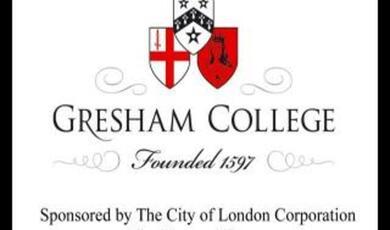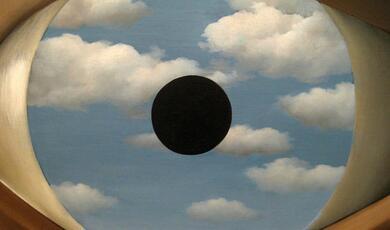Why is there evil?
Share
- Details
- Text
- Audio
- Downloads
- Extra Reading
Download Text
Why is there Evil?
Professor Gwen Griffith-Dickson
If anything is universal in philosophical reflection, across ages and cultures, it is systematic inquiry into the problems of evil. What is not universal, however, are the actual problems that arise within particular religious frameworks, nor the underlying attitude towards suffering. Buddhists do not have to struggle with the question: ‘Why does God allow suffering?’ Muslims do not have to try to explicate the workings of karma. These are problems that arise in part from the particular philosophical and religious framework that a religion has and works within.
The question I want to focus on is a question that the major religions all have to address: simply, why is there evil and suffering? The religious traditions I want to consider today typically try to say ‘why’ from two directions: what is the origin of evil, and what is the purpose, if any, of suffering and wrongdoing in the larger scheme of things? For example, one answer to a version of the latter question – why does God allow human beings to commit evil acts – is because God has decided to give humanity free will and thus gives us scope. This question however is one I want to leave for our panel next time, so in this lecture I will focus on the question of the origins of evil.
The Source of All
Some thinkers boldly assert that God is the source of evil as well as good. Passages in the Hebrew Scriptures stress that God is the source of all: weal and woe. Islamic thinkers who insist on the absolute supremacy and omnipotence of God would rather cope with the tensions raised for God’s goodness than compromise God’s transcendence and power. Ash‘ari wrote: ‘Good and evil (occur) through the decree and power of God. We believe in God’s decree and power—the good as well as the evil, the sweet as well as the bitter.’ [1] The Ash‘arite position was that God is the only agent, God alone ‘creates acts’, even human action; thus God is the source even of evil. And although Christians often shy away from any association between God and evil, some theologians, such as Oswald Bayer, do not hesitate to speak from personal experience of
the incomprehensible, terrible hiddenness of God, in which he conceals himself in an omnipotence both dark and endlessly distant and at the same time infinitely close – consumingly, burningly, oppressively close, closer than I am to myself; in that omnipotence which creates life and death, light and darkness (Isaiah 45.7), love and hate (Ecclesiastes 9.1f.), conservation and destruction, weal and woe (Amos 3.6, Isaiah 45.7), evil and good (Lamentations 3.38), in short: that he works all in all – inextricably and impenetrably to us. [2]
Jakob Boehme suggests that good and evil, as an opposition, arise from the same creative source of the divine; as part of life and movement. Finally, he reaches the conclusion that evil itself becomes a consequence of the first, ultimate divine principle: the wrathful side of God. The psychologist Carl Gustav Jung hinted at much the same thing.
A World Created
‘ When the rabbi reproached the tailor for taking six weeks to make a pair of trousers, while it took God no more than six days to create an entire world, the tailor parried. “Yes, Rabbi,” he said, “but just see what a world created in a hurry looks like.”’ [3]
In the Judaic and the Christian traditions, when God created the universe He created His Other rather than His self. So in order to be differentiated from God, the universe cannot be perfect; there must be a metaphysical or ontological difference between God and the world. It is from this necessary inherent imperfection that evil arises.
Within the Jewish tradition, one way of conceiving divine creation evolves out of the notion of tsimtsum, or Divine contraction, found in Lurianic Kabbala.
[The] very essence of [God] leaves no space whatsoever for creation, for it is impossible to imagine an area which is not already God, since this would constitute a limitation of His infinity. … Consequently, an act of creation is possible only through ‘the entry of God into Himself,’ that is, through an act of zimzum whereby He contracts Himself and so makes it possible for something which is not [God] to exist. Some part of the Godhead, therefore, retreats and leaves room, so to speak, for the creative processes to come into play. [4]
This absence-of-God’s-presence is a necessary condition for the existence of other things, but also entails imperfection. It leads to the creation of ‘vessels’, one of which is ‘primordial humanity’, which then ‘break’ from the irresistible pressure of the divine light which they contain. This ‘breaking of the vessels’ leads to the roots of evil.
Both Augustine and Aquinas engage the ontological difference between God and the world to explain the existence of suffering and evil. They further develop the doctrine by suggesting that in order to have a full range of good things, a hierarchy of goods must exist. Not only does this entail some rather defective things at one end of the continuum, there are some things that arise from change, which itself brings imperfection.
R. Kropf weaves this Thomist tradition across the woof of a modern conception of evolution:
Perhaps evil, or what we take to be evil, especially in the course of natural events, exists primarily because creation, understood as an evolutionary process, necessarily begins with forms of existence that are as totally unlike God as possible. This would not deny God’s immanence or presence within the working of the process, but rather offer a new, dynamic understanding of what Thomas Aquinas said long ago: that the basic reason for God’s immanence within creation (sustaining things’ existence and providentially guiding them toward their fulfillment) is to be found precisely in his total ‘otherness’ from them as the transcendent cause of their existence. In terms of good and evil, this would mean that created things, at least in their primitive evolutionary beginnings, would be at the same time as totally unlike God and as imperfect as could be imagined! [5]
Evolution and inevitable metaphysical imperfection can be used to reckon with the defects of the material world—but also with the defects of the moral world. Psychological and spiritual versions of ‘evolution’ appeal to the tastes of the times more than notions of original sin. Human mischief might result from psychological or biological dispositions that may be morally neutral in themselves, but can be turned in the direction of evil. The philosopher of religion John Hick [6] maintains that the tradition of Irenaeus places less emphasis on a Fall and paints a picture instead of fallible human beings, created in the ‘image’ but not the ‘likeness’ of God. The ‘image of God’ is found in human nature as it is created, whereas the ‘likeness of God’ is our final perfecting by the Holy Spirit. This implies that, as with a likeness to one’s mother, one has to grow into and mature into a ‘likeness’ to God for it to be visible. Thus while we are born with moral freedom and responsibility, we are only at the beginning of a process of growth and development which will eventually culminate in the finite ‘likeness’ of God. Sin, therefore, should not be seen as a wicked revolt against God calling for condemnation, but as a weakness calling for compassion; it is part of our growth and evolution.
These accounts bed the existence of evil into the very nature of a created, material universe, in a way that makes suffering and destruction seem inevitable. They suggest that evil is not something added on to the world which could just as easily have been forestalled, or could now be removed, by a decent Deity. Rather, the roots of evil are just part of the structure of the universe.
A Stable World
Here the philosopher can appeal to natural laws and the role they play in our cognitive and moral development. In order for the natural order to remain stable and predictable, it is undesirable for frequent divine interventions to take place to subvert the course of nature. This would undermine our growth in causal and moral reasoning. [7]
Richard Swinburne insists that for us to learn and develop morally, we need to experience the consequences of good and bad actions: one cannot learn from one’s actions if there are no consequences. If we are to make moral choices, we need to learn from past experiences, and ‘if all knowledge of the future is obtained by normal induction, that is by induction from patterns of similar events in the past—then there must be serious natural evils occurring to man or animals.’ [8] But for this knowledge to develop, ‘laws of nature must operate regularly; and that means that there will be… “victims of the system”.’ [9] But could God not intervene to protect such victims? If He did, Swinburne replies, ‘others will not take the trouble to help the helpless next time, and they will be rational not to take that trouble. For they will know that more powerful help is always available.’ [10] This means that as an unfortunate but necessary consequence, serious evils will occur.
David Basinger observes that given the great number of widespread causal factors in our world, God cannot significantly lessen the amount of evil and death without having to intervene directly and continuously in our world. [11] Each intervention that upsets the causal apple-cart requires further interventions to right things again; or as Birnbaum puts it, even an omnipotent Deity could not intervene to overthrow natural laws without unravelling the cosmos. [12] Moreover, Basinger argues that if God was continually circumventing natural and psychological laws, it would destroy our belief that anticipated consequences will normally follow certain actions; in which case, ‘we must seriously question whether we can retain a meaningful concept of “free choice”.’ [13] Basinger concludes that ‘continuous widespread divine intervention into our present natural system would make meaningful human choice impossible (or at least greatly lessen its meaningfulness).’ [14] Could we function as rational people if natural laws were continually disrupted and our own decisions frequently undermined, with unpredictable results? [15]
Human Responsibility
Most religious traditions suggest somewhere in their tales or texts that evil mainly exists insofar as we create it ourselves or deserve it. This seems to be an idea that occurs easily to human beings.
Karma
The simplest yet most comprehensive solution to the origin of evil in Indian religion is the doctrine of karma.
The foundation stone of Buddhism is the explanation of the origin of evil and suffering, and the account given by the Buddha stands out against the backdrop of Indian philosophy and religion. The origin of the suffering of human existence is set forth in the Buddha’s doctrine of Dependent Origination, [16] the lack of understanding of which gives rise to our misery. Each phenomenon of human experience is dependent on, connected to, another; they arise inseparably in a chain, but can also cease as each link is broken.
Karma depends on ignorance;
Consciousness depends on karma;
Name and form depend on consciousness;
The six organs of sense depend on name and form;
Contact depends on the six organs of sense;
Sensation depends on contact;
Desire depends on sensation;
Attachment depends on desire;
Existence depends on attachment;
Birth depends on existence;
On birth depend old age and death, sorrow, lamentation, misery, brief, and despair. Thus does this entire aggregation of misery arise. [17]
On the other hand, with ‘the complete fading out and cessation of ignorance’ karma ceases; when karma ceases consciousness ceases, and so on; and thus the knitting of misery can unravel once that first stitch is severed. Ignorance, then, is the root cause of all suffering and evil in the Buddhist tradition.
In contrast, the Hindu scriptures all recognise a diversity of possible causes of trouble. It could arise from immediate or past human action, from divine action, from hereditary traits, from natural causes, from sorcery, or simply ‘fate’. [18] The most salient network of ideas accounting for the existence of evil and suffering, however, is the combined doctrines of samsara and karma. So crucial does the theory of karma become, that some effort went into ensuring that theories about causality in the natural world do not undermine the moral force of the karma doctrine, by offering a way in which natural events can be understood as punishment and reward in the karmic process.
Although karma is distinctively Indian in origin, the conviction that human responsibility is at the bottom of the matter appears in many different religions. The Jewish notion of tochacha (based on Lev. 26 and Dt. 28) tells us that trouble is primarily a divine punishment for sin, and should prompt us to examine our deeds. This punishment can extend to the children of sinful parents (cf. Ex. 34.7, 20.5) or to other members of the community. The agency of God in enacting this punishment is explicit in the concept of tochacha, whereas Indian traditions differ on the question of whether karma requires a God to oversee and administer it.
The Fall
The human origin of evil is sometimes depicted in narrative or mythological form. The story is told in Judaism, Christianity, and Islam, that an omnibenevolent God created a first human couple, to be his vice-regents on earth, as the Qur’an describes it, and created a paradise for them to inhabit. Other rational beings, angels, were also created. Both the humans and the angels were endowed with free will. One angel used his free will to rebel against God; to place himself first. He and those who followed his example fell from grace; their previously good natures became twisted and infected by evil. These angels became the Devil and the demons, who tempt others and create evils and suffering in the world.
Adam and Eve, the first human pair, were tempted by Satan into disobeying the rules God had laid down for the enjoyment of Eden. They changed thereby the course of human history: they were expelled from Paradise and condemned to live in conditions of greater physical hardship. In the Islamic tradition, they repented and their continued existence is portrayed as a form of second chance. In the Christian tradition, a continued fault line runs through humanity in the form of ‘original sin’: as Augustine interprets it, all human beings were present seminally in Adam, and thus all were corrupted. The notion of ‘original sin’ is traditionally interpreted as implying that no human being is born free of sin; none has the perfect will power to avoid sin. All evil is thus explained in terms of sin; not only moral evil, but also (potentially) natural evil, which could be attributed to demonic activity.
The Mahabharata gives an account of karma and samsara in a story of human origins that has interesting parallels with the Semitic ‘Fall’ mythology, albeit within a thoroughly Indian metaphysical framework. [19] In the primal age, human beings lived in ‘pure’ bodies, were free of physical and moral imperfections, were godlike, honest, and pious; were able to commute between heaven and earth and to see the gods directly, without any aid or special procedures. Their lifespan ran to thousands of years. But over time, they fell prey to wrath and lust, became subject to delusion, and then were reborn in unfortunate incarnations (demons, animals, mere human beings) and accumulated a store of evil and good deeds. Thus begins karma; our past actions ‘follow us like a shadow’. But even in this fallen state, the wise may gain insight into this state of affairs and with lives of piety may gain control over their fates through good and wise action.
Subtle Order
Reflect! The order of life
Is a subtle, marvellous, unique order,
For nothing but death endears life,
And only the fear of tombs adorns it;
Were it not for the misery of painful life,
People would not grasp the meaning of happiness.
Whomever the scowling of dark does not terrify,
Does not feel the bliss of the new morning. [20]
(Abu al-Qasim al-Shabbi?)
A final network of explanations for the reality of evil arises from logical considerations. Is evil the logically necessary counterpart to good? Can some good results only arise by means of some bad things? Could we recognise and appreciate good if there was no evil?
The appeal for a half-mercy
The Islamic theologian al-Nazzam argued that a just world required a mixture of opposing components, including good and evil. These reflections were developed by his student, al-Jahiz. If creation were totally good, ‘the requisite testing, the trial-and-error conducive to thought, would also cease.’ [21] ‘It is the opposition of things within creation that provokes thought. Without thought, there would be neither discrimination nor choice. Knowledge itself would no longer be possible.… It is through the opposition of good and evil, perfect and imperfect, that we acquire knowledge.’ [22] Where Swinburne, Basinger and others have argued that one needs to experience consequences of action to develop moral knowledge, here al-Jahiz extends the principle to all cognition.
Here is a Talmudic story: The Evil Tempter was captured. The captors started to kill it, but were warned that if they did, the entire universe would fall apart, so they contented themselves with imprisoning him instead. Three days later, they searched throughout the land trying to find a fresh egg, but could find none. When there is no sex drive, there can be no eggs. They were faced with a dilemma: if they did not release the Evil One, they could not continue with life as they knew it; if they did release him, evil would roam the land once more. They appealed to heaven for a ‘half-mercy’: the Tempter should live, but not tempt us with evil. A voice answered from above: ‘They do not grant halves in heaven.’ [23]
Many phenomena are ambivalent when viewed from the perspective of human utility. Fire is both extremely beneficial and extremely dangerous. Many things can be the source of much pleasure, good, and benefit, but can be potentially dangerous. So to be rid of some evils we would have to do without some goods. The same quality can yield both pleasure/benefit and pain/harm, so to remove the harmful potential of some phenomena removes the beneficial potential as well. This means that to remove any possible evil or danger would remove much pleasure and goodness at the same time. To remove the mind-altering or intoxicating properties of wine to render it harmless would remove much or perhaps most of the pleasures of drinking. We would only have premier cru grape juice. That would certainly be a less-than-best possible world. Dangers can also yield pleasures, as lovers of sports and adventures know. God might have so created us as to always freely benefit from and take pleasure in what is wholly beneficial to us; drinking cod’s liver oil in a bubble-bath would be as luxurious and delicious as drinking champagne in the same location, and driving prudently would give adolescent males the same rush of adrenaline as driving too fast. But it could be argued that the delights of the freedom to enjoy things to excess so outweighs the tedium of a lifetime of forced moderation that it constitutes a greater good in itself; and the occasional pleasures to be had precisely in being naughty make free will and fallibility worth having.
Yes, to hunger and not have, yet hope on for,
To storm, and strive, and be at every assault
Fresh-foiled, worse flung, deeper disappointed,
The turmoil and the torment, it has, I swear, a sweetness,
Keeps a kind of joy in it: a zest, an edge, an ecstasy… [24]
(Gerard Manley Hopkins)
The Perfect Rightness of the Actual
‘Overstretch one lute-string and the melody is lost.’ [25] (Thomas Aquinas)
Al-Ghazali’s cardinal principle has been described as ‘the perfect rightness of the actual’. [26] His fundamental tenet is that the world as it is, is ‘most wonderful’, unsurpassable; as God has willed it and brings it into being moment by moment, it cannot be better. Even its defects contribute to its excellence; for it is what has been willed by God. That fact that it does not perfectly please us, that we call what upsets us ‘evil’ and what pleases us good, is neither here nor there because we are not omniscient and omnibenevolent.
Hawaiian religion espouses a principle called lokahi: unity, agreement, harmony. Lava is destructive of plant and animal life; but when its fire, its dryness, its barrenness is balanced with water, it makes a tremendously fertile soil, and the ‘ohi‘a-lehua trees and the hapu‘u ferns move in and repopulate the renewed earth. For Hawaiians, the activity of the volcano was the act of the goddess Pele, in all her destructive power: a power for destruction, as so many stories tell, that often followed on human cruelty or hard-heartedness. In Hawaiian thought, destruction is no less a witness to the divine.
In Islamic philosophy, some argued that God’s justice means that God is obliged to provide the best for us.Yet the founder of the Baghdad school, Bishr ibn al-Mu‘tamir, declared: ‘It is not obligatory for God to do the best of things for man; indeed, this is absurd because there is no end and no term to the beneficence which God can perform.’ [27] And here he has made a point lost on some modern Western commentators. Many object that this is not the best of all possible worlds and imply that God should have created a better one: one with people who could do no wrong, with no natural dangers, or one with a different built-in ‘stopping point’ on the continuum of suffering. Others, Plantinga, Adams and Aquinas [28] among them, believe that the notion of a ‘best possible world’ is about as coherent as ‘the largest possible prime number’. One can always push the frontiers back. Dream up the best of all possible worlds; now add a few more chocolates. You’ve now got a better best possible world. Now add one more act of kindness. Your ‘best possible world’ is no longer the best.
Aquinas maintained that as an important affirmation of God’s omnipotence, whatever world is actual, God could always have created a better one. Aquinas felt it would be a compromise of God’s power to claim that God could not, so to speak, outdo himself. The result of this, paradoxical for God’s omnipotence, is that precisely because God is omnipotent, he can never create a ‘best of all possible worlds’. God cannot be blamed for not creating a best of all possible worlds, for that is logically impossible. No matter how good the world and our natures were, so long they were not perfect, human beings could (and probably would) always complain about such evil as existed. The relativity inherent in human perceptions and reactions to our experience means that we would find any evil or lack of a possible good to be something worth complaining about.
Conclusion
The Indian religions have often been able to absorb evil and suffering into a larger picture, seeing both lightness and dark as adding to the richness of the work.
The cosmic dynamism of which we ourselves are minute manifestations cannot be fitted to the dimensions of our brain, any more than to the brains of ants; for the universe is the holy revelation of an absolutely transcendent essence. We can be glad to understand it even a little, in terms appropriate to the range of our egocentric sensual and mental faculties. Though characterized every moment by perishableness, the universal whirling process in itself is everlasting, even as is the hidden power from which it derives. It is everlasting, indeed, through the very transiency [sic] of its continually appearing and vanishing phenomena–all these evanescent forms. And precisely because these break, it is everlasting. The cloud-shadows of death and bereavement darken the face of the world every second; these race across the moonlit, sunlit scene–but they do not outbalance the light, the fulfillment of life’s joy in the perpetual begetting of new forms. The world, in spite of its pain, is as it were enraptured by itself, and does not count the hurts that go with the procedure: as though lovers in their rapture should mind whether the kisses hurt, or a child eagerly swallowing ice cream whether the chill was a little painful. Everything depends on where one puts the emphasis…. A continuous blending and transformation of opposites through a relentless vital dynamism–even asking for pains, to balance and enhance the intensity of delight–goes spontaneously, powerfully, and joyously with this terrific Oriental acceptance of the whole dimension of the universe. [29]
Monotheists often have more trouble accepting this idea, and indeed this ‘Oriental acceptance’ is sometimes denigrated as ‘Indian fatalism’. There is a powerful personal contradiction for the monotheist in the very existence of evil: for if God is all-powerful and all-loving, he would want to eliminate evil and ought to be able to. And yet we suffer. Is it God’s will that we should suffer? If not, why does he let it happen?
Next time I will be joined by several other monotheist theologians from different faiths to wrestle with God. For now, I will leave you with the words of Gerard Manley Hopkins, in a poem which speaks powerfully of mental torment and despair:
Not, I’ll not, carrion comfort, Despair, not feast on thee:
Not untwist—slack they may be— these last strands of man
In me or, most weary, cry I can no more. I can;
Can something, hope, wish day come, not choose not to be.
But ah, but O thou terrible, why wouldst thou rude on me
Thy wring-world right foot rock? Lay a lionlimb against me? scan
With darksome devouring eyes my bruised bones? and fan,
O in turns of tempest, me heaped there; me frantic to avoid thee and flee?
Why? That my chaff might fly; my grain lie, sheer and clear.
Nay in all that toil, that coil, since (seems) I kissed the rod,
Hand rather, my heart lo! lapped strength, stole joy, would laugh, cheer.
Cheer whom though? The hero whose heaven-handling flung me, foot trod
Me? or me that fought him? O which one? is it each one? That night, that year
Of now done darkness I wretch lay wrestling with (my God!) my God.
© Gwen Griffith-Dickson, October 2003
References:
Al-Ash‘ari, al-Ib’nah ‘an u’ul al-diy’nah (Cairo, 1977), p. 23, cited in E. Ormsby, Theodicy in Islamic Thought (Princeton University Press, 1984), p. 24. Oswald Bayer, ‘Poetological Theology’, translated by Gwen Griffith-Dickson, International Journal of Systematic Theology 1 (1999), p. 165. N.N. Glatzer (ed.), The Dimensions of Job: A Study and Selected Readings (Schocken Books, 1969), p. 221. G. Scholem ‘Kabbalah’, in Encylopedia Judaica, Vol. 10, cols 588-601, col. 589. R.W. Kropf, Evil and Evolution: A Theodicy (Fairleigh Dickinson University Press, 1984), p. 41. John Hick, Evil and the God of Love (Macmillan, 1990). The theodicy itself will be examined in the next chapter. Reichenbach and Swinburne argue along these lines. See Bruce Reichenbach, Evil and a Good God (Fordham University Press, 1982), and ‘Evil and a Reformed View of God’, International Journal for Philosophy of Religion 24 (1988), pp. 67-85. R. Swinburne, The Existence of God (Clarendon Press, 1979). Ibid., p. 211. Ibid., p. 210. Ibid., pp. 210f. D. Basinger, ‘Evil As Evidence against God’s Existence’, in M. Peterson (ed.), The Problem of Evil: Selected Readings (University of Notre Dame Press, 1992), pp. 146-148. D. Birnbaum, God and Evil: A Unified Theodicy/Theology/Philosophy (Ktav Publishing House, 1989), p. 97 and p. 144. Basinger, ‘Evil As Evidence against God’s Existence’, op. cit., p. 147. Ibid. These points can still be defended by those who believe that God does sometimes intervene in the course of human history. Extraordinary and rare interventions (‘miracles’), or God’s action as a response to human prayer, would not have the same confusing effect. We can be occasionally confounded without having our sense of the intelligibility of things destroyed. Principal sources for this doctrine of paticca-samupp’da are the Samyutta Nik’ya 2.1-133, and the D’gha Nik’ya 2.55-71.
Samyutta Nik’ya, 22, 90. This version is my arrangement of the text. ‘The fact that various spokesmen in the Mah’bh’rata designate first one then another factor as the cause of events would seem to indicate that they did not feel that the total complexity of forces at work in the world could be accounted for by reference to a single principle or agent.’ Long, in O’Flaherty (ed.), Karma and Rebirth in Classical Indian Traditions, op. cit., p. 47. Both Long and O’Flaherty provide numerous textual examples. Mah’bh’rata 3.179-221; see the discussion in J. Bruce Long, ‘Karma and Rebirth in the Mah’bh’rata’, in O’Flaherty (ed.), Karma and Rebirth in Classical Indian Traditions, op. cit., pp. 49-52. Abu al-Qasim al-Shabbi’ (1909-1934), Diwan (Beirut, 1972), pp. 342-343, cited in Ormsby, Theodicy in Islamic Thought, op. cit., p. 265. Abu al-Qasim al-Shabbi (1909-1934), Diwan (Beruit, 1972), p. 223. Ibid., pp. 223f. T. B. Yoma, 69b. My paraphrase of H.M. Schulweis’ paraphrase in Evil and the Morality of God (Hebrew Union College Press, 1984), p. 137. From the unfinished poem, St Winifred’s Well. Gerard Manley Hopkins, The Poems of Gerard Manley Hopkins, edited W.H. Gardner and N.H. MacKenzie (Oxford University Press, fourth edition, 1980), p. 191. Thomas Aquinas, Summa Theologica Ia25,6, ad 3. Ormsby, Theodicy in Islamic Thought, op. cit., pp. 221-225, 259-265, et passim. Al-Ash‘ari, Maq’l’t al-isl’m’y’n (ed. Ritter; Istanbul, 1929-33) I, 246. Cited in Ormsby, Theodicy in Islamic Thought, op. cit., p. 22. Plantinga writes: ‘What is the reason for supposing that there is such a thing as a best of all possible worlds?’. A. Plantinga, God, Freedom and Evil (Allen & Unwin, 1975), p. 34. Aquinas also implicitly rejects the idea, thinking it an important affirmation of God’s omnipotence that for every world God creates, he could create a better one. See Summa Theologica, Vol. I, qn. 25, art. 6, translated by the Fathers of the English Dominican Province; cf. Stewart, The Greater Good Defence, op. cit., pp. 57f., and F. Copleston, A History of Philosophy: Medieval Philosophy, Vol 2., Part II (Doubleday and Company, 1962), p. 89. Zimmer, Philosophies of India, op. cit., p. 350.
This event was on Wed, 08 Oct 2003
Support Gresham
Gresham College has offered an outstanding education to the public free of charge for over 400 years. Today, Gresham College plays an important role in fostering a love of learning and a greater understanding of ourselves and the world around us. Your donation will help to widen our reach and to broaden our audience, allowing more people to benefit from a high-quality education from some of the brightest minds.


 Login
Login







